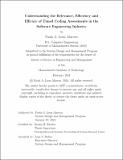Understanding the Relevance, Efficiency and Efficacy of Timed Coding Assessments in the Software Engineering Industry
Author(s)
Leon Alarcon, Paola A.
DownloadThesis PDF (1.412Mb)
Advisor
Rhodes, Donna H.
Terms of use
Metadata
Show full item recordAbstract
Software engineering has grown as a market in the past decades to become one of the most profitable and widespread globally. Given the demand for software products, software engineers and their skills have also become highly sought-after. Even though there is great demand for software engineers, companies are looking to hire the best possible talent, forcing them to implement assessment mechanisms to evaluate candidates and their technical proficiency. Consequently, interviewing processes for software positions have become highly competitive and rigorous for prospective candidates. The volume of applicants has also forced companies to implement mechanisms that allow for screening candidates at an efficient cost. As a consequence, timed coding assessments and other technical interviewing methods have been raised as an alternative to screening candidates.
A survey was disseminated where participants were asked about their experience with timed coding assessments. Twelve volunteers willing to participate in a semi-structured interviewed were recruited from those surveyed with the goal of understanding their experiences in more depth. It was found that timed coding assessments can be an effective filtering tool to narrow the pool of candidates but did not show consistent relevancy with respect to the job duties and responsibilities software engineers might need to carry out if offered a position. Furthermore, preparation for these types of examinations was found to be fundamental for their clearance and further advancement into the interviewing stages, showing that qualification came secondary to preparation.
Date issued
2024-02Department
System Design and Management Program.Publisher
Massachusetts Institute of Technology